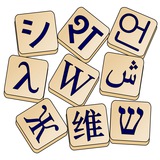✳ monitor (noun)
Sounds:
- /ˈmɒ.nɨˌtə/ (Received-Pronunciation)
- /ˈmɔn.ɪˌtɚ/ (General-American)
- /ˈmɔn.əˌtɚ/ (General-American)
Forms:
- monitors (plural)
monitor (noun) senses:
1. Someone who watches over something; a person in charge of something or someone.
2. A device that detects and informs on the presence, quantity, etc., of something.
3. (computing) A device similar to a television set used as to give a graphical display of the output from a computer.
...
Sounds:
- /ˈmɒ.nɨˌtə/ (Received-Pronunciation)
- /ˈmɔn.ɪˌtɚ/ (General-American)
- /ˈmɔn.əˌtɚ/ (General-American)
Forms:
- monitors (plural)
monitor (noun) senses:
1. Someone who watches over something; a person in charge of something or someone.
2. A device that detects and informs on the presence, quantity, etc., of something.
3. (computing) A device similar to a television set used as to give a graphical display of the output from a computer.
...
✳ monitor (verb)
Forms:
- monitors (present, singular, third-person)
- monitoring (participle, present)
- monitored (participle, past)
- monitored (past)
monitor (verb) senses:
1. (transitive) To watch over; to guard.
Forms:
- monitors (present, singular, third-person)
- monitoring (participle, present)
- monitored (participle, past)
- monitored (past)
monitor (verb) senses:
1. (transitive) To watch over; to guard.
💡 Example 💡 behest
behest (noun): And young Mr. Fleetwood Vibe was here at the behest of his father, Wall Street eminence Scarsdale Vibe, who was effectively bankrolling the Expedition.
Ask @wikt_en_bot for 'behest'
behest (noun): And young Mr. Fleetwood Vibe was here at the behest of his father, Wall Street eminence Scarsdale Vibe, who was effectively bankrolling the Expedition.
Ask @wikt_en_bot for 'behest'
🗣 Conversation 🗣
Lee has been a great asset to the church, he read the Lord's word.
- (Lee) The pastor said I've be a great asset to the church.
- Wow! What did you do to make him say that?
- I've been reading the Lord's word.
- You're very inspirational. I should stop by one Sunday.
- You're always welcome to join me.
Lee has been a great asset to the church, he read the Lord's word.
- (Lee) The pastor said I've be a great asset to the church.
- Wow! What did you do to make him say that?
- I've been reading the Lord's word.
- You're very inspirational. I should stop by one Sunday.
- You're always welcome to join me.
✳ reduce (verb)
Sounds:
- /ɹɪˈdjuːs/ (Received-Pronunciation)
- /ɹɪˈd͡ʒuːs/ (Received-Pronunciation)
- /ɹɪˈduːs/ (General-American)
Forms:
- reduces (present, singular, third-person)
- reducing (participle, present)
- reduced (participle, past)
- reduced (past)
reduce (verb) senses:
1. (transitive) To bring down the size, quantity, quality, value or intensity of something; to diminish, to lower.
2. (intransitive) To lose weight.
3. (transitive) To bring to an inferior rank; to degrade, to demote.
...
Sounds:
- /ɹɪˈdjuːs/ (Received-Pronunciation)
- /ɹɪˈd͡ʒuːs/ (Received-Pronunciation)
- /ɹɪˈduːs/ (General-American)
Forms:
- reduces (present, singular, third-person)
- reducing (participle, present)
- reduced (participle, past)
- reduced (past)
reduce (verb) senses:
1. (transitive) To bring down the size, quantity, quality, value or intensity of something; to diminish, to lower.
2. (intransitive) To lose weight.
3. (transitive) To bring to an inferior rank; to degrade, to demote.
...
🗣 Conversation 🗣
Rylie is teaching Sasha how to swim. Riley told Sasha to hold her breath.
- (Riley) I was teaching Sasha to swim.
- How did that go?
- Really well, it took a lot of practice but after a while she could hold her breath.
- That's great progress..
- Next I will teach her how to tread water.
- Good luck with that.
Rylie is teaching Sasha how to swim. Riley told Sasha to hold her breath.
- (Riley) I was teaching Sasha to swim.
- How did that go?
- Really well, it took a lot of practice but after a while she could hold her breath.
- That's great progress..
- Next I will teach her how to tread water.
- Good luck with that.
💡 Example 💡 cinder
cinder (noun): Oh, horrid proposition! One would imagine, Tom, that you had been a coal-heaver. Had you said soda and cinder, I would have seconded the motion.
Ask @wikt_en_bot for 'cinder'
cinder (noun): Oh, horrid proposition! One would imagine, Tom, that you had been a coal-heaver. Had you said soda and cinder, I would have seconded the motion.
Ask @wikt_en_bot for 'cinder'
✳ map (noun)
Sounds:
- /mæp/ (General-American, Received-Pronunciation)
Forms:
- maps (plural)
map (noun) senses:
1. A visual representation of an area, whether real or imaginary, showing the relative positions of places and other features.
2. A graphical or logical representation of any structure or system, showing the positions of or relationships between its components.
3. (mathematics) A function.
...
Sounds:
- /mæp/ (General-American, Received-Pronunciation)
Forms:
- maps (plural)
map (noun) senses:
1. A visual representation of an area, whether real or imaginary, showing the relative positions of places and other features.
2. A graphical or logical representation of any structure or system, showing the positions of or relationships between its components.
3. (mathematics) A function.
...
✳ map (verb)
Forms:
- maps (present, singular, third-person)
- mapping (participle, present)
- mapped (participle, past)
- mapped (past)
map (verb) senses:
1. (transitive) To represent by means of a map.
2. (transitive) To create a map of; to examine or survey in order to gather information for a map.
3. (intransitive, followed by a "to" phrase) To have a direct relationship; to correspond.
...
Forms:
- maps (present, singular, third-person)
- mapping (participle, present)
- mapped (participle, past)
- mapped (past)
map (verb) senses:
1. (transitive) To represent by means of a map.
2. (transitive) To create a map of; to examine or survey in order to gather information for a map.
3. (intransitive, followed by a "to" phrase) To have a direct relationship; to correspond.
...
